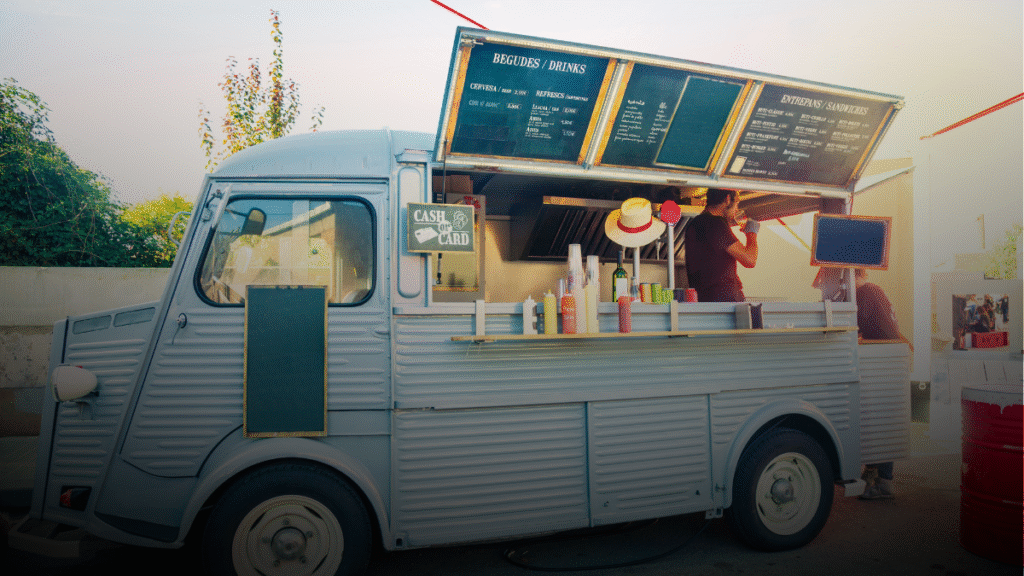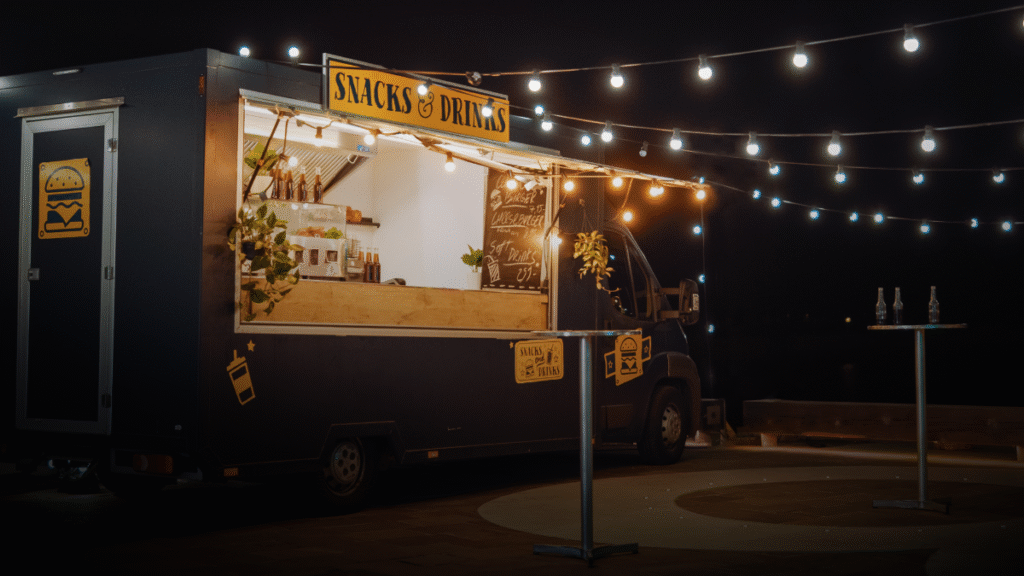Table of Contents
🚚 Introduction: Why You Need a Food Truck Business Plan
Launching a food truck is more than just putting your favorite recipes on wheels. While the idea may sound fun and creative, the foundation of a successful food truck lies in a well-thought-out business plan. In this guide, we’ll break down everything you need to include in a solid business plan for food truck—from finances and permits to marketing and daily operations.
A business plan acts like your GPS—it shows where you’re going and how you’ll get there. Whether you’re applying for a loan, seeking investors, or planning operations, a clear roadmap is essential.
📋 Executive Summary: Start with a Snapshot
Here is a food truck business plan template, you can use for your business. Your executive summary should capture the essence of your food truck business in about a page. It’s often the first section lenders or investors read, so make it count. Business Plan for Food Truck
Include:
- Business name & concept: What kind of food will you serve? What’s your brand’s personality?
- Mission statement: Why does your food truck exist?
- Location & market: Where will you operate, and who are your ideal customers?
- Objectives: What do you aim to achieve in 1, 3, and 5 years?
- Financial snapshot: Projected revenue and expenses
Make sure this section is punchy, persuasive, and paints a clear picture of your venture. Business Plan for Food Truck
🏙️ Industry Overview and Market Analysis
Knowing the food truck landscape in your area is essential. This part of your plan demonstrates your awareness of industry trends, customer demand, and local competition.
Key points to research:
- Food truck trends: Are gourmet street foods popular? Vegan? Ethnic cuisine?
- Target audience: Are you appealing to office workers, students, tourists, or nightlife crowds?
- Customer behavior: When and where do they eat on the go?
- Competitor analysis: Who else is on the street, and what are they doing right (or wrong)?
Tools like Google Trends, Yelp, and local Facebook groups can offer insights into what works and what gaps you can fill.
🍴 Defining Your Food Truck Concept and Menu
The heart of your food truck is your menu and concept. These should be tightly aligned with your brand identity and what your target market craves. Business Plan for Food Truck
Questions to ask yourself:
- What type of cuisine will I serve?
- Is the menu simple enough for quick service?
- Can I source ingredients easily and affordably?
- How will I stand out (fusion dishes, local flavors, Instagram-worthy plating)?
Example Concepts:
- Korean-Mexican fusion tacos
- Organic smoothie and salad truck
- Late-night gourmet grilled cheese
- Vegan BBQ
Make sure your menu can be efficiently prepared in the limited space of a truck, with minimal waste and consistent quality.
💰 Food Truck Startup Costs and Budget Planning
Before you hit the road, you need to map out the numbers. Knowing your startup and ongoing costs will help you stay realistic and avoid surprises. Business Plan for Food Truck
Typical Startup Costs:
- Food truck purchase/retrofit: $25,000 – $100,000+
- Equipment (grills, fryers, fridge, POS): $10,000 – $25,000
- Permits and licenses: $1,000 – $5,000
- Marketing and branding: $2,000 – $5,000
- Initial food inventory: $1,000 – $3,000
- Insurance: $1,500 – $3,000 annually
Ongoing Expenses:
- Ingredients and supplies
- Staff wages
- Fuel and maintenance
- Commissary rent (if applicable)
- Utilities and data plans
Having a spreadsheet with projected monthly income and expenses will make it easier to forecast profit and determine break-even points.
📝 Permits, Licenses, and Legal Considerations

This is the unsexy—but essential—part of your food truck business plan. Every city has its own rules, and compliance is critical to avoid shutdowns. Business Plan for Food Truck
Common Permits Needed:
- Business license
- Mobile food vendor permit
- Health department inspection
- Fire safety inspection
- Parking permits or location contracts
- Employee food handler cards
Contact your local health and business licensing department early to find out exactly what you’ll need. Include these steps and estimated costs in your plan.
🛠️ Operational Plan: How Your Truck Will Function
Your operations section should answer the “how” behind the business—how you’ll deliver consistent, quality food while managing day-to-day logistics. Business Plan for Food Truck
Cover:
- Staffing: Number of employees, roles, and shifts
- Prep and service flow: How food is made, stored, and served
- Suppliers: Where ingredients come from and how often you restock
- Scheduling: Daily routes, lunch rushes, events
- POS system: How you’ll process orders and payments
- Health and safety: Sanitation practices, equipment checks
This section shows you’ve thought through the nuts and bolts of your mobile kitchen.
📢 Marketing and Branding Strategy: Business Plan for Food Truck
You can have the best food in town—but if no one knows about your truck, it won’t matter. That’s where a smart marketing plan comes in. Business Plan for Food Truck
Effective Marketing Ideas:
- Social media: Use Instagram, Facebook, and TikTok to showcase your food and daily location.
- Food truck locator apps: Platforms like Roaming Hunger help customers find you.
- Local SEO: Set up your Google Business profile so people can find you when searching “food trucks near me.”
- Email marketing: Send promotions, event announcements, and menu updates.
- Event participation: Sign up for local festivals, street fairs, or farmer’s markets.
Be sure to include your logo, color scheme, truck design, and brand voice—your visual identity matters!
📈 Financial Projections and Funding Strategy
This is often the most scrutinized part of a business plan by lenders and investors. Show you’ve done the math.
Include:
- Revenue forecast (based on meals per day, average sale)
- Expense estimates
- Break-even analysis
- Cash flow projections (monthly, quarterly, annually)
- Profit and loss forecast
- Capital needed and how it will be used Business Plan for Food Truck
Also, explain how you plan to fund the business: personal savings, SBA loan, grants, crowdfunding, or private investment.
❓ FAQ: People Also Ask About Food Truck Business Plans
Q1: What makes a food truck business plan different from a restaurant plan?
A food truck business plan focuses more on mobility, route planning, permits, and quick service rather than traditional dining logistics. Business Plan for Food Truck
Q2: How detailed should my food truck plan be?
Very! The more details you include, the better prepared you’ll be—and the more likely you are to secure funding.
Q3: Can I use a food truck business plan template?
Yes. Templates are a great place to start. Just make sure you customize the content to reflect your brand, market, and goals.
Q4: How long does it take to write a good business plan?
Anywhere from a few days to a few weeks, depending on how much research you’ve done. Take your time—it’s worth the effort.
Q5: Is a business plan really necessary if I’m self-funded?
Yes! Even if you don’t need external funding, a business plan keeps you focused, organized, and accountable.
🚀 Final Thoughts: Ready to Roll?
Creating a detailed business plan for food truck is the smartest way to turn your culinary passion into a profitable, sustainable business. It’s your chance to visualize the dream, prepare for roadblocks, and position yourself for success.
💬 Ready to Launch Your Food Truck?
Have questions or want feedback on your business plan for food truck?
👇 Drop your concept in the comments—we’d love to hear from you!
And don’t forget to subscribe to our blog for more guides on food entrepreneurship, marketing tips, and small business growth.




